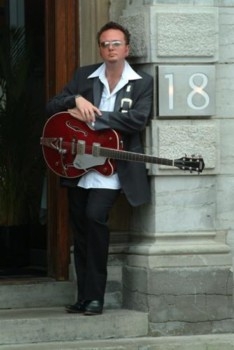Press

Electric, But Superbly Acoustic
From: JazzReview.com
Artist Interview by: Joe Montague

He still hasn't reached his fortieth birthday, but blues guitarist, singer/songwriter David Gogo has twice been named Maple Blues Guitarist of the Year in his native Canada. This spring his current album Acoustic: Official Bootleg Series- Volume 2 was nominated for a Juno Award, the nation's equivalent of a Grammy. In 2004, the blues man was named as the recipient of the Canadian Broadcasting Corporation's, Great Canadian Blues Award for his lifetime contribution to blues music in Canada. Past recipients of the award have including such luminaries as David Wilcox, Colin James, Sue Foley and Long John Baldry.
Gogo's career began as a fourteen year-old, in the Vancouver Island city of Nanaimo, British Columbia, located on Canada's west coast. In a country better known for its contribution of jazz, rock and country artists to the international music scene, the only thing missing from Gogo's resume is recognition south of the 49th parallel, although that too may soon change since he is attracting more attention from American audiences.
In 2006, Gogo introduced his CD Skeleton Key to the US market, an album originally released in Canada during 2002. "We just felt that Skeleton Key was too strong not to put out in the US, even though it was a couple of years old," says Gogo, "I think that was the right choice. In Canada, we had lots of coverage for the cover of the Depeche Mode tune "Personal Jesus," which at the time was kind of unique, but after I released my album there was a Johnny Cash cover. We also had success with '(Just Ask) Jesse James,' There have been people who have chosen "Skeleton Key" (the title track) as their wedding song," he says recounting the early success that the album Skeleton Key enjoyed.
Gogo estimates that during the past two years, he has probably opened about twenty or so concerts for Johnny Winter, gigs that opened the door for him to receive a 2006 invitation to perform at the Pittsburgh Blues Festival. The CD, Skeleton Key, was well received and in addition to several standing ovations that he received, the CD garnered good sales at the Pennsylvania festival. This summer's highlights will include an appearance at the Rochester International Jazz Festival in New York state on June 15, and an August 11 gig at the Bayfront Blues Festival in Duluth, Minnesota.
When American audiences hear Gogo's music, this summer they may be wondering what has taken the artist so long to crack the US market, however, a quick examination of border policies between Canada and the US exposes a significant disparity in reciprocity as it relates to the music industry. Gogo explains, "For American artists coming to Canada, it is not a problem because it is considered a cultural event and they do not require work papers. However, for us, to enter into the United States as Canadians, they require a ridiculous amount of time. It used to be 30-days notice, but now they want 90 days, and it has gone as high as one hundred and twenty days."
Despite the obstacles in terms of making inroads to the larger American market, Gogo feels the tide is slowly turning as more people become aware of his electric blues music. Visit his website, listen to the tunes and begin ordering his CDs online.
In true blues fashion, the song "She's Breakin' Through," from his CD Acoustic, is drawn from the fabric of the land, in this case Vancouver Island. "It talks about a coal mining disaster that happened in 1925, south of Nanaimo. "My great-grandfather was drowned, along with eighteen other men," says Gogo. "These guys were in a mine that was surrounded by other abandoned workings. Typical of the day, the owners told them (the miners) to keep digging, even though they knew there were other mines that were flooded and danger was imminent. One day they blasted through, and these nineteen guys were drowned. After they pumped out all the water, they found one man who appeared to have climbed up to an air pocket. He had one arm around a timber in the mine, and the other arm was holding his teenage son who had also worked at the mine. I thought, 'how tragic, that they may have come from another country hoping for a new start, and his last moments were spent working under horrible conditions, holding onto his son for dear life.'"
"This is a history lesson for us," says Gogo, "as we realize what hard work and suffering people had to go through when they first came to this country, building it into what it is today. I think people overlook that," he says.
Although Gogo had known that his great-grandfather had perished in a mining accident, he did not realize it was the same one that the song remembers until he began researching the event.
Throughout the years, the once sparsely populated Nanaimo has contributed several outstanding artists to the music industry, including three outstanding women of jazz--Diana Krall, Christine and Ingrid Jensen. Gogo says proudly of his hometown, "There has always been an extremely high level of talent here. When I was fourteen, I used to play with older guys at jams and everybody was really, really good. When I was nineteen and traveled to Victoria (the provincial capitol), I thought the players would be a lot better because the city is bigger. That was not the case." Gogo says that even in high school, the stage bands would often win gold and silver medals in national competitions. "I am always amazed at the talent level coming from Nanaimo," he says.
It was during his teenage years that Gogo struck up a friendship with one of his idols, legendary Austin, Texas, guitarist Stevie Ray Vaughn. Despite the fact that Gogo in an act of hero worship donned a Vaughn like hat, he credits the musician for encouraging him from the beginning to establish his own identity.
In addition to Gogo, Acoustic has excellent performances from some other artists, including upright bass player Rick May. "He was the glue that held it (the CD) together. I couldn't think of anyone around here that played the standup bass in the right genre and could cut the mustard in terms of what I wanted to hear. I had just joined myspace and one of the first guys that signed up to be my friend was Rick May. He is such a master of his instrument, and a great guy to work with. The descending notes that he plays, and the phrases that he chose for the first song "Killing Me," brought so much color to the project. I am hoping to work with him more in the future."
Gogo also received strong performances from the two harmonica players who appear on Acoustic, longtime friend Gerry Barnum and Michael Pickett. Pickett happened to be in Nanaimo when Gogo was completing his CD. Not realizing that Gogo still needed a harmonica player for the song "How Strong My Love Is," Pickett joked that Gogo should have had him appear on the CD. As they say, timing is everything and Pickett wound up on Acoustic.
Vocalist Tina Jones, pianist Rick Hopkins and violinist Jeremy McDonald also turn in strong performances for the Acoustic project.
Roosevelt Jamison's "That's How Strong My Love Is," is a cover tune that closes out Acoustic. The song serves up reminders of some of Gogo's other musical influences. "I have always been a big fan of Stax Records (rather than) Motown. I am a big Otis Redding fan. Sometimes when I am singing or writing a song, I realize that it is coming from a whole different soul background. I was in Memphis for a few days and I went to the Stax Museum of American Soul Music. The re-creation of the studio and the Otis Redding display really brought all of that back to me," Gogo recalls.
Continuing to talk about "That's How Strong My Love Is," Gogo says, "I like the barebones approach to the song on this album. It has been covered many times, often as a big production with horns, so to strip it down to its roots gave it a poignancy." The album also has a quality cover of Robert Johnson's "Dust My Broom."
Gogo is gearing up for an ambitious summer tour schedule in both Canada and the United States and hopes to someday return to gigs in Europe where he has been a popular performer in the past.
Photo by: © Stephen Wild
Copyright© JazzReview.com®. All Rights Reserved.


